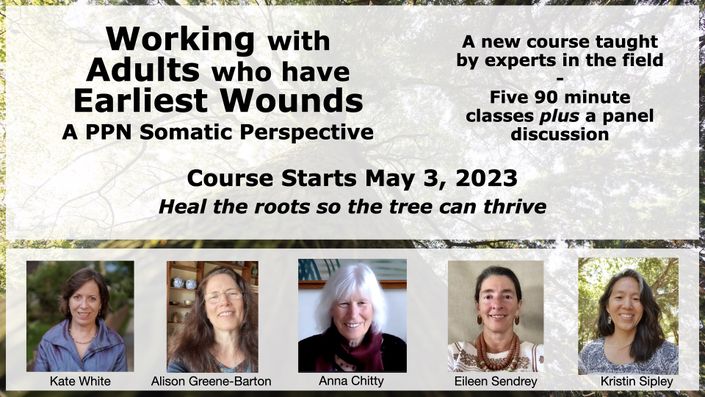
Working With Adults Who Have Earliest Wounds
A Prenatal and Perinatal Somatic Approach
Another Great Series from Prenatal and Perinatal Healing Online!
Six 90 minute recorded presentations
Lifelong access
Working with Adults Who Have Earliest Wounds: A PPN Somatic Perspective
Our earliest layers of experience form the roots of health on every level: body, mind and spirit. These earliest experiences include preconception, conception, the prenatal period, birth and after birth. Many practitioners of all kinds now seek to know more about how to work with earliest trauma in adults, especially with the increased awareness of developmental or complex trauma, and in the impact of the Adverse Childhood Experiences study.
Often called early developmental trauma, recognizing, reaching and healing ruptures or interruptions in development from this early time are increasingly seen as the cracks in the foundation of human health. Current healing science now includes overwhelming childhood experiences and ancestral patterns; the prenatal and perinatal period is the missing piece.
Once the patterns from earliest trauma are recognized, they cannot be unseen. Our challenge is to give the tools of recognition to practitioners of all kinds while laying the groundwork for prevention, which is doable in our world today.
We have invited five practitioners who work in the field of prenatal and perinatal somatics to help share with you tools, skills and their approach to helping with adults with earliest wounds.
Speakers:
- Lecture 1: Kate White - Heal the Roots so the Tree can Thrive: Working with Adults Who Have Earliest Trauma
- Lecture 2: Alison Greene-Barton - Welcoming Who You Are from Spirit Form into Physical Form
- Lecture 3: Anna Chitty - The Transformative Power of Presence to Heal Earliest Wounds
- Lecture 4: Eileen Sendrey - Touching the Earth — Mind Body Connection as a Foundation for Somatic Practitioner Skills
- Lecture 5: Kristin Sipley - Shifting Perspectives: Shining a Light on the Threads of Health
- EXTRA: Panel Discussion

Your Instructor

Kate White is an award-winning educator and an advanced bodyworker. She is trained in somatic therapies, prenatal and perinatal somatic health, lactation, brain development, infant mental health, and has specialized in parent-baby dyad care using somatic prevention and trauma healing approaches since 1999. She is a mother of two children, holds a BA and MA in Communication, is a Registered Craniosacral Therapist in the Biodynamic Craniosacral method, a Polarity Life Counselor and a Somatic Experiencing® Practitioner. Her work combines somatic trauma healing, especially the approach of Anna Chitty’s Blueprint Resonance work, energetic therapies, bodywork, pediatric therapies and education about the nervous system to help give families with babies and small children the best possible start. She is Founding Director of Education for the Association for Prenatal and Perinatal Psychology and Health where from 2013 – 2019 she created and ran the Prenatal and Perinatal Educator Certificate program, a large online educational program for professionals. She went on to found Prenatal and Perinatal Healing Online and the Prenatal and Perinatal Somatics Institute. She teaches classes online and in person, and offers training called Integrated Prenatal and Perinatal Dynamics that she co-created with midwife Lois Trezise. She has a private practice in Chapel Hill, NC called Kate White PPN (katewhiteppn.com) and offers her own seminars through the Center for Prenatal and Perinatal Programs, ppncenter.com and the Prenatal and Perinatal Somatics Institute, ppnsomatics.com
Course Curriculum
-
StartLecture 1 - Kate White: Heal the Roots so the Tree can Thrive: Working with Adults Who Have Earliest Trauma (162:37)
-
StartLecture 2 - Alison Greene-Barton: Welcoming Who You Are from Spirit Form into Physical Form (111:48)
-
StartLecture 3 - Anna Chitty: The Transformative Power of Presence to Heal Earliest Wounds (92:41)
-
StartLecture 4 - Eileen Sendrey: Touching the Earth — Mind Body Connection as a Foundation for Somatic Practitioner Skills (97:39)
-
StartLecture 5 - Kristin Sipley: Shifting Perspectives: Shining a Light on the Threads of Health (103:01)
-
StartEXTRA - Panel Discussion (98:04)
